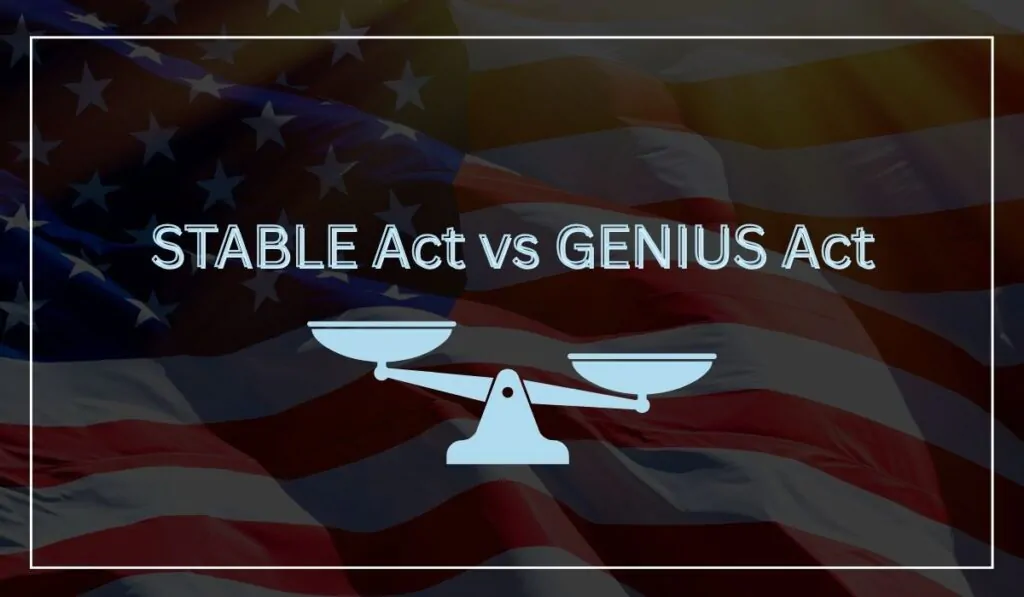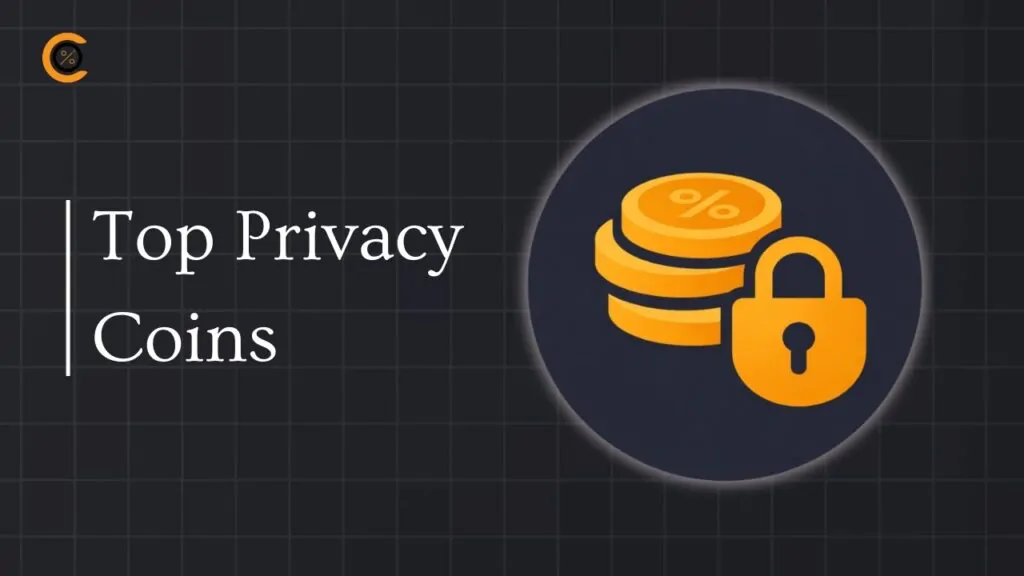- GENIUS Yasası, banka dışı kuruluşların federal denetim altında stablecoin ihraç etmesine izin verirken, STABLE Yasası, ihraçları yalnızca bankalarla sınırlıyor.
- GENIUS Yasası, stablecoin sahiplerine iflas durumunda süper öncelik tanıyor; STABLE Yasası ise bundan bahsetmiyor.
- STABLE Yasası eyalet düzeyindeki katılımı vurgularken, GENIUS Yasası esas olarak Fed ve OCC gibi federal düzenleyicilere dayanmaktadır.
ABD Kongresi dijital varlıkları düzenlemeye yaklaşırken, iki rakip yasa tasarısı, STABLE Yasası ve GENIUS Yasası, konuşmanın merkezinde ortaya çıktı. STABLE Yasası ile GENIUS Yasası arasındaki farkı anlamak GENIUS Yasası takip eden herkes için önemlidir ABD kriptosu Bu önerilerin, stablecoin ihraççıları, bankalar, fintech'ler ve kripto kullanıcıları için önemli sonuçlar taşıması nedeniyle 2026 yılında düzenlemeye gidilmesi bekleniyor.
Yasama Arka Planı
Her iki yasa tasarısı da ABD doları gibi itibari para birimlerine sabitlenmiş dijital varlıklar olan sabit paraları düzenlemeyi amaçlıyor. Ancak, yaklaşımları farklı felsefeleri yansıtıyor. İlk olarak 2020'de sunulan ve 2025'te Temsilciler Meclisi Finansal Hizmetler Komitesi tarafından yeniden düzenlenen STABLE Yasası, sıkı denetime ve eyalet düzeyinde esnekliğe odaklanıyor. Bu arada, ABD Sabit Paraları için Ulusal Yeniliği Rehberlik Etme ve Kurma anlamına gelen GENIUS Yasası, Senato'da ilgi gördü ve yaygın olarak daha piyasa dostu bir alternatif olarak görülüyor.
Yapısal ve Düzenleyici Farklılıklar
Karşıtlığın temel noktası, iki yasa tasarısının stablecoin ihraççılarını nasıl tanımladığı ve düzenlediğidir. STABLE Yasası, tüm ihraççıların sigortalı mevduat kuruluşları gibi muamele görmesini ve tam bankacılık düzenlemelerine tabi tutulmasını önermektedir. Bu, onların federal bankacılık tüzükleri edinmelerini, FDIC sigortası bulundurmalarını ve geleneksel bankalara benzer sermaye gerekliliklerini sürdürmelerini gerektirecektir.
GENIUS Yasası ise, bunun aksine, ikili bir model sunar. Banka bağlantılı ihraççılar Federal Rezerv denetimine girerken, banka dışı ihraççılar 10 milyar doların üzerinde varlık yönetmeleri koşuluyla Para Birimi Denetçisi Ofisi (OCC) tarafından düzenlenir. Bu model, banka dışı firmalar için daha fazla esneklik sağlarken onları federal standartlara karşı sorumlu tutar.
Veren Kuruluşun Uygunluğu ve Sınırlamaları
STABLE Yasası uyarınca, yalnızca mevduat kuruluşu olarak onaylanan bankalar veya kurumlar stablecoin ihraç edebilir. Uygulamada, bu, yeniden yapılandırılmadıkları sürece büyük fintech oyuncularını ve kripto yerli şirketleri hariç tutabilir.
GENIUS Yasası uygunluğu genişletiyor ancak belirli sınırlar koyuyor. Fintech'lere ve diğer kuruluşlara kapıyı açarken, Meta veya Amazon gibi finansal olmayan halka açık şirketlerin, gelişmiş gizlilik ve finansal güvenlik önlemlerini karşılamadıkları sürece stablecoin çıkarmasını açıkça yasaklıyor. Bu, finans alanında Büyük Teknoloji etkisine ilişkin endişeleri gidermek için Senato'nun önemli bir uzlaşmasıydı.
Rezerv ve Denetim Gereksinimleri
Her iki yasa tasarısı da stablecoin'lerin tam olarak desteklenmesini zorunlu kılıyor ancak denetim çerçeveleri farklı.
MKS GENIUS Yasası sabit paraların nakit veya nakit benzeri varlıklarla 1:1 oranında desteklenmesini gerektirir ve piyasa değeri 50 milyar doların üzerinde olan herhangi bir ihraççı için yıllık kamu denetimleri yapılmasını gerektirir. Ayrıca sabit para sahiplerinin taleplerini diğer alacaklılara göre önceliklendiren iflas korumaları da oluşturur.
MKS İSTİKRAR Yasası benzer destek gerekliliklerini içerir ancak banka tarzı incelemeler aracılığıyla gerçek zamanlı denetime daha fazla vurgu yapar. GENIUS Yasası'nın yaptığı gibi, iflas halindeki stablecoin sahipleri için açıkça bir "süper öncelik" maddesi içermez.
Uygulama ve Gözetim
Kuralları kimin uyguladığı açısından, STABLE Yasası eyalet düzeyindeki iş birliğine daha fazla güvenerek, eyalet düzenleyicilerinin bazı alanlarda, özellikle onay süreçlerinde öncülük etmesine olanak tanır. Bu merkeziyetsizlik, bazıları esnekliği överken, diğerleri olası tutarsızlıklar konusunda uyararak karışık tepkiler aldı.
GENIUS Yasası, denetim için federal kurumlara, özellikle OCC ve Federal Rezerv'e yaslanır. Ayrıca çıkar çatışması ifşaları için hükümler ekler: hükümet yetkilileri herhangi bir ödeme sabit parasında 5,000 dolardan fazla tutarlarsa bunu bildirmek zorundadır ve görevdeyken bir para biriminin çıkarılmasına aktif olarak katılmak yasaktır.
Siyasi Destek ve Momentum
Şu anda, GENIUS Yasası yasama ivmesi açısından avantaja sahip. 17 Haziran 2025'te, Senato'nun daha önceki prosedür aşamalarında başarılı iki partili desteğin ardından yasa tasarısı üzerinde oylama yapması planlanıyor. GENIUS Yasası, yabancı ihraççılar, AML uyumluluğu ve kurumsal katılımla ilgili sorunları ele aldıktan sonra yeterli Demokrat desteğini güvence altına alarak müzakere yoluyla gelişti.
Bu arada STABLE Yasası, Temsilciler Meclisi'ndeki komite düzeyinde onaylandı ancak henüz tam oylamaya geçilmedi. Daha katı yaklaşımı, yenilikçiliği engelleyebileceğini savunan serbest piyasa savunucuları ve kripto girişimcileri arasında endişelere yol açtı.
Hızlı Karşılaştırma Tablosu
| Özellikler | GENIUS Yasası | İSTİKRAR Yasası |
|---|---|---|
| Veren Kuruluşun Uygunluğu | Bankalar ve nitelikli banka dışı kuruluşlar | Sadece bankalar (mevduat kuruluşları) |
| Denetim Otoritesi | Fed (bankalar), OCC (bankalar dışı) | Federal kurumlar + eyalet düzenleyicileri |
| Denetim Gereksinimi | Yıllık kamu denetimleri (>50 milyar dolar) | Banka tarzı gerçek zamanlı denetim |
| Stablecoin Desteği | 1:1 nakit veya eşdeğerleri | 1:1 destek, ayrıntılar düzenleyiciler tarafından belirlenir |
| Büyük Teknoloji Kısıtlamaları | Finansal olmayan kamu şirketlerini yasaklar | Belirli hükümler yok |
| Devlet Yetkililerinin Açıklamaları | Evet (>$5,000 tutarında varlık) | Belirtilmedi |
| İflas Halinde Sahip Koruması | Süper öncelikli statü | Belirtilmedi |
| Yasama İlerlemesi (17 Haziran itibariyle) | Senato oylaması bekleniyor | Komiteden geçti, henüz Meclis'te tam oylama yapılmadı |
Son Düşüncelerimiz
STABLE Yasası ile GENIUS Yasası tartışması, ABD'de stablecoin düzenlemesi için iki farklı vizyonu vurguluyor; biri sıkı, geleneksel bankacılık denetimine dayanıyor, diğeri daha uyarlanabilir bir federal çerçeve sunuyor. Şu an itibariyle, GENIUS Yasası, daha geniş iki partili destek ve yenilik için daha esnek yollarla yasalaşmaya daha yakın görünüyor. Ancak STABLE Yasası, ihtiyatlı yasa koyucuların dijital finans alanındaki risk hakkında ne kadar düşündükleri konusunda önemli bir referans noktası olmaya devam ediyor.
Hangi yasa tasarısı geçerse geçsin, sonuç ABD'nin küresel stablecoin piyasasında kendini nasıl konumlandıracağı konusunda belirleyici bir rol oynayacak.






![Phantom'da Dil Nasıl Değiştirilir [2026]](https://www.cryptowinrate.com/wp-content/uploads/2026/02/How-to-Change-the-Language-in-Phantom-2026-1024x576.jpg)
